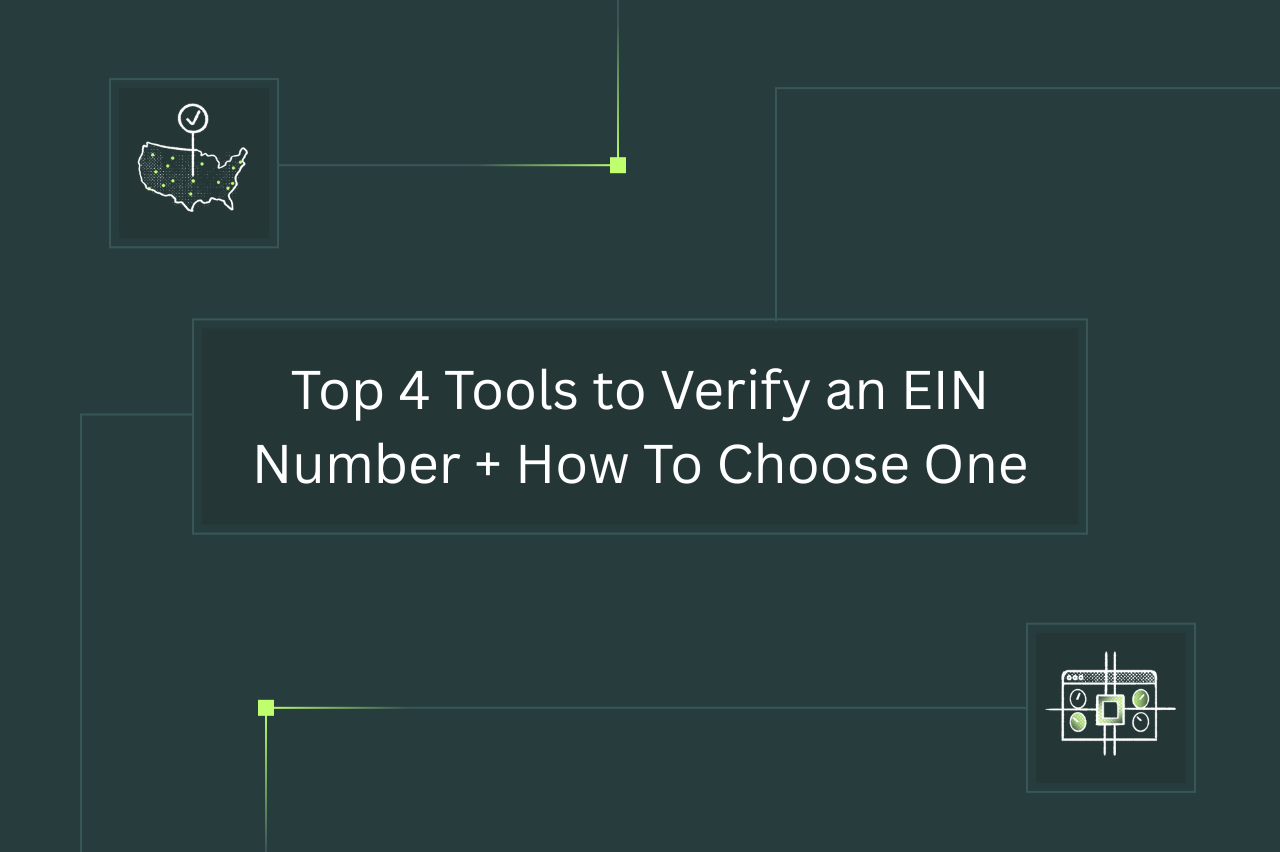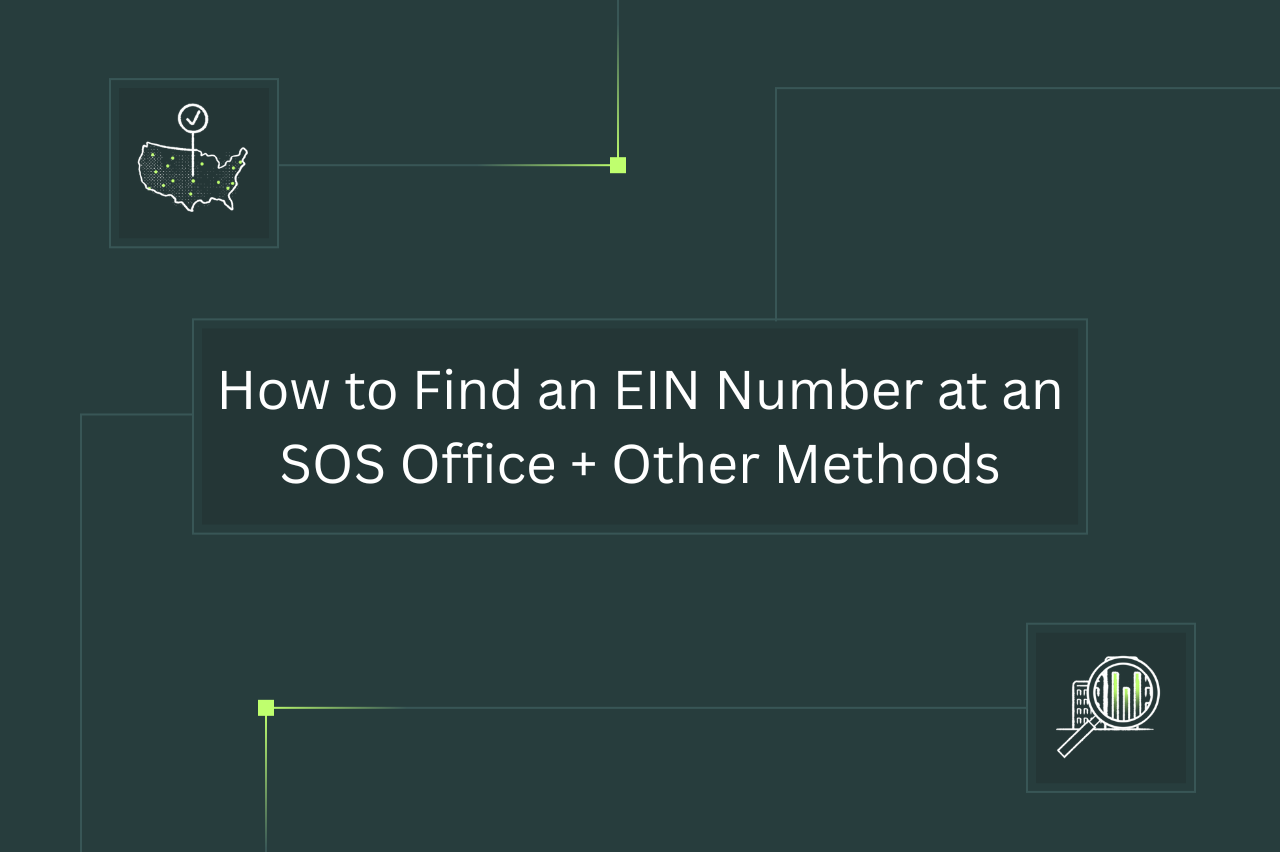In brief:
- EIN verification is the process of determining whether a U.S. business has a valid and unique Employment Identification Number. This is a business-exclusive form of TIN issued by the IRS.
- All U.S. businesses must have an EIN to maintain a workforce, manage finances, and deal with legal affairs as businesses, making an EIN check an ideal verification process for KYB purposes.
- EIN verification systems should be gauged on data accuracy, data freshness, ease of integration, and the relevance of data sources.
One of the requirements that nearly all U.S. businesses need to operate legally is to be properly registered to pay taxes. That means applying for an Employment Identification Number, or EIN, from the Internal Revenue Service (IRS).
In the context of business-to-business relationships, a valid and unique EIN is a solid signifier to check whether a business you want to work with is legitimate and operating within U.S. law. So for verification and risk assessment purposes, an organization wanting to onboard a business as a client, partner, or counterparty should ensure the business is properly registered with an EIN.
This article discusses automated KYB solutions for authenticating a business’s EIN in a business verification context, and how an organization can choose one appropriate to its needs.
- What is EIN verification?
- Why EIN verification is essential
- Top 4 features to look for in an EIN verification system
- How to choose an EIN verifier
- Top 4 EIN verification services
We’ll start by explaining more about what EINs are, and why an organization might need to verify one for another business.
EIN verification is the process of checking if a business is properly registered with tax authorities in the U.S. It’s a check to ensure not only that a business has an Employment Identification Number at all, but also that the EIN is valid and unique to that business (as opposed to fake or stolen).
EINs are issued on application from the Internal Revenue Service, and pretty much any business in the U.S. needs one in order to legally operate. An EIN is a specific form of Tax Identification Number (or TIN) reserved for tracking tax returns from U.S. businesses. In contrast, a Social Security Number (SSN) is a type of TIN used to track individual U.S. citizens’ tax returns.
Organizations wanting to onboard other businesses as clients or partners need to undergo a process called “Know Your Business”, or “KYB”, each time. This consists of establishing whether or not a business—including its beneficial owner(s)—is representing itself truthfully, operating legitimately, and safe (or at least legal) to form a relationship with.
All U.S. businesses are required by law to have an EIN number in order to hire and pay employees, conduct financial transactions, and file their taxes. Therefore, verifying the authenticity and originality of a business’s EIN number lets an organization know that the business is legally registered to operate in the U.S. This is important for an organization to avoid the legal liability and other risks associated with dealing with an improperly-licensed business.
Here are some basic capabilities that an EIN verifier should have if an organization wants to use it for business verification.
1. Valid format checking
All EINs are 9-digit numbers in the format “XX-XXXXXXX”. So an EIN verification solution should be able to search for EINs based on this format.
2. Valid prefix checking
The IRS has a list of valid EIN prefixes, so EIN verification software should be able to check EINs based on this list to immediately spot phony EINs.
3. Change history checking
There are times when a business has to apply for a new EIN number. This usually happens when a business is new or changes its ownership structure (e.g. it changes from a sole proprietorship to an LLC).
EIN verification providers should be up-to-date with the most current EINs for businesses. It may also be helpful if the EIN checker can track the history of a business’s EIN changes. That way, an organization can recognize an EIN as one that a business previously had, but is no longer valid.
4. Integration with official sources
EIN numbers can sometimes be found in places such as on business credit reports, or on a business’s website or other written publications (e.g. letters or invoices). Ideally for compliance purposes, though, EINs should be verified against official records kept by government agencies.
Agencies with official business documentation that would contain a business’s authentic EIN include the Secretary of State (SoS) offices in each state and territory, the IRS, and the Securities and Exchange Commission (SEC). An EIN verification system is likely more trustworthy if it connects directly to one or more of these agencies.
To fully assess your potential EIN verification services, we’ve put together a full breakdown of how to run a KYB vendor test that determines which is the best for your organization.
{{gated-content-block="/insights/report-middesk-index"}}
So what does an organization need to think about when looking for an EIN verification solution? These are some key considerations.
- Data freshness: How often is EIN data updated to reflect the current reality? Remember that a business may be required to apply for a new EIN number if its ownership structure changes. So an EIN verification service that doesn’t update frequently enough may have a business’s previous EIN number, which used to be valid but no longer is.
- Data source: Where is the EIN verification solution sourcing its data from? Ideally, the source should be a government agency that an EIN has to officially be registered with. So, for example, if it sources data from the IRS, an EIN verification system tends to be more trustworthy than one that gets its data from proprietary third parties.
- Format checking: Can an EIN checker recognize the proper format for an EIN number? EIN numbers are 9 digits long, typically in the format “XX-XXXXXXX”, and have a limited number of valid two-digit prefixes (i.e. EINs starting with 00, 07, 08, 09, 17, 18, 19, 28, 49, 69, 70, 78, 79, 89, 96, or 97 are always fake).
- Value for money: Remember that verifying a business’s EIN number is just one part of determining if the business is legitimate and safe to deal with. So ideally, an EIN verification solution shouldn’t cost too much to implement. Or, if it does, it should come with other verification features for authenticating a business’s identity and assessing its risk to onboard.
To fully assess your potential EIN verification services, we’ve put together a full breakdown of how to run a KYB vendor test that determines which is the best for your organization.
{{gated-content-block="/insights/how-to-run-an-effective-kyb-vendor-test"}}
So how do some of the popular EIN verifiers on the market stack up in these terms? We’ll go over that next.
To give your organization a starting point in selecting an EIN verifier to use, here are four prominent options.
1. Middesk
Best for: Business verification information, including EIN validation, straight from Secretary of State offices and other government sources
Middesk has direct connections with all Secretary of State offices in the U.S., and can automatically retrieve SOS documents. This allows it to check businesses’ EINs against the official state and territory agencies where they’re required to be registered.
At the same time, Middesk can also check other information useful for business verification. This includes financial sanctions/watch list presence, adverse media coverage, industry classification, formation document authenticity, ongoing litigations, and more.
2. EINsearch
Best for: Easy-to-use platform focused on TIN finding
EINsearch provides services for looking up individual TIN numbers (including EINs) or validating them in batches. Tapping into IRS records, it can find or match over 20 million EINs through a dashboard or API. However, it’s somewhat pricey (starting at $25 per month), and its data refresh rate can be as long as three months.
3. Fraud Technology
Best for: Dedicated and cost-efficient EIN verification
Fraud Technology’s EIN Verification Tool cross-checks input EINs against IRS databases. This allows for fast and accurate verifying of businesses’ EIN numbers. The company also allows for unlimited use of the tool throughout the contract, making it cost-effective.
The tool was mainly developed for financial institutions, particularly for preventing tax fraud and identity theft when lending to businesses. So additional tools are necessary for verifying other information necessary for KYB.
4. Veri-Tax
Best for: Flexible and secure tax identity information
Veri-Tax has a variety of solutions for verifying both SSNs and EINs, along with finding related information. They fetch EIN numbers directly from the IRS for instant “match or no match” results, and provide a customer report for additional information.
However, onboarding one of the services has somewhat increased friction, as it requires a corporate account with Veri-Tax to use (out of concerns for data privacy and security, which Veri-Tax prides itself on). Finally, it only allows searching for the same business name twice in a 24-hour period.
The main drawback of many EIN verification platforms is that they only do one thing: verify EINs (and maybe some other tax-related information). But few give an organization the full picture of what it needs to know to safely onboard a business in compliance with KYB regulations.
Middesk Verify, on the other hand, does. Not only can Middesk verify EINs for businesses, but we can also provide registration information checks, watchlist screening, virtual document copies, litigation/bankruptcy searches, and more. Talk to our sales team to set up a demo and see our EIN verification capabilities first-hand.









